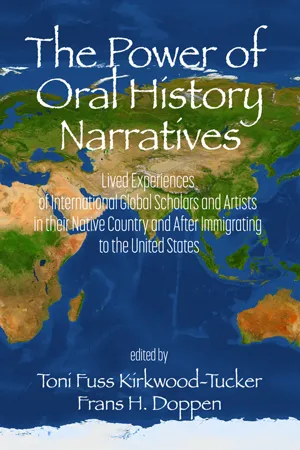
The Power of Oral History Narratives
Lived Experiences of International Global Scholars and Artists in their Native Country and After Immigrating to the United States
- English
- PDF
- Available on iOS & Android
The Power of Oral History Narratives
Lived Experiences of International Global Scholars and Artists in their Native Country and After Immigrating to the United States
About this book
The significance of this book is its uniqueness. First, the book contains a collection of fourteen chapters that capture the personal, professional, and historical experiences of international global scholars and artists to which they were subjected in their native country and after they immigrated to the United States. What makes this book project highly unusual in comparison to other publications is that these international global scholars and artists experienced historical events of trauma and joy in their native country and in their newly adopted country of the United States that lie deeply buried in their sub-consciousness; that these memories are unforgettable and still painful for them; that these memories are a constant companion in their daily lives; and that the experienced historical events of trauma and joy have shaped their professional and personal lives to this very day. There exists a paucity in the global education literature of this far-reaching topic and, thus, it has the potential to enhance and diversify the global education literature.Second, the significance of this book lies in the pedagogical power of the oral history narrative tradition and its impact on students at the secondary and tertiary levels in education. When one's lived experiences of trauma or joy occur during a critical time in history, they rarely yield unforgotten memories and deeply held private knowledge that do not come to light without a storyteller. When first-hand accounts are shared publicly, they can bring powerful insights into past historic events to the very presence. Thus, the pedagogical strength of this book contributes to knowledge creation in the classroom as oral histories move students from abstract textbook descriptions to concrete and compelling "lived" stories associated with historical happenings. This pedagogy leads students to become more critical of historical events of the past and develops in them a deeper understanding of the past. Consequently, oral history narratives enable teachers and teacher educators to enrich the abstract text of textbooks with the authentic voice of the individual.A third significance of this book lies embedded in the rich historical perspective displayed by storytellers of non-native international global scholars and artists from around the world who portray their lived-through, first-hand experiences such as child labor, communism, hate, hunger, fascism, fear, intolerance, discrimination, prejudice, poverty, war, protest, and death. Finally, a major purpose of this book is to expose young learners from around the world to empowering non-native international role models in global education and the arts from nations in Africa, Asia, the Caribbean, Eurasia, Europe, the Middle East, and South America who build bridges—not walls—between peoples and nations.
Frequently asked questions
- Essential is ideal for learners and professionals who enjoy exploring a wide range of subjects. Access the Essential Library with 800,000+ trusted titles and best-sellers across business, personal growth, and the humanities. Includes unlimited reading time and Standard Read Aloud voice.
- Complete: Perfect for advanced learners and researchers needing full, unrestricted access. Unlock 1.4M+ books across hundreds of subjects, including academic and specialized titles. The Complete Plan also includes advanced features like Premium Read Aloud and Research Assistant.
Please note we cannot support devices running on iOS 13 and Android 7 or earlier. Learn more about using the app.
Information
Table of contents
- Cover
- Advance praise
- REVIEW BOARD
- The Power of Oral History Narratives
- Library of Congress Cataloging-in-Publication Data
- Dedication
- CONTENTS
- ACKNOWLEDGMENTS
- GENESIS OF OUR BOOK
- SIGNIFICANCE OF OUR BOOK
- METHODOLOGY
- OUTLINE OF NARRATIVES
- INTRODUCTION
- SECTION I—AFRICA
- SECTION II—ASIA
- SECTION III—CARIBBEAN
- SECTION IV—EURASIA
- SECTION V—EUROPE
- SECTION VI—MIDDLE EAST
- SECTION VII—SOUTH AMERICA
- EPILOGUE
- ABOUT THE EDITORS
- ABOUT THE CONTRIBUTORS
- SUBJECT INDEX